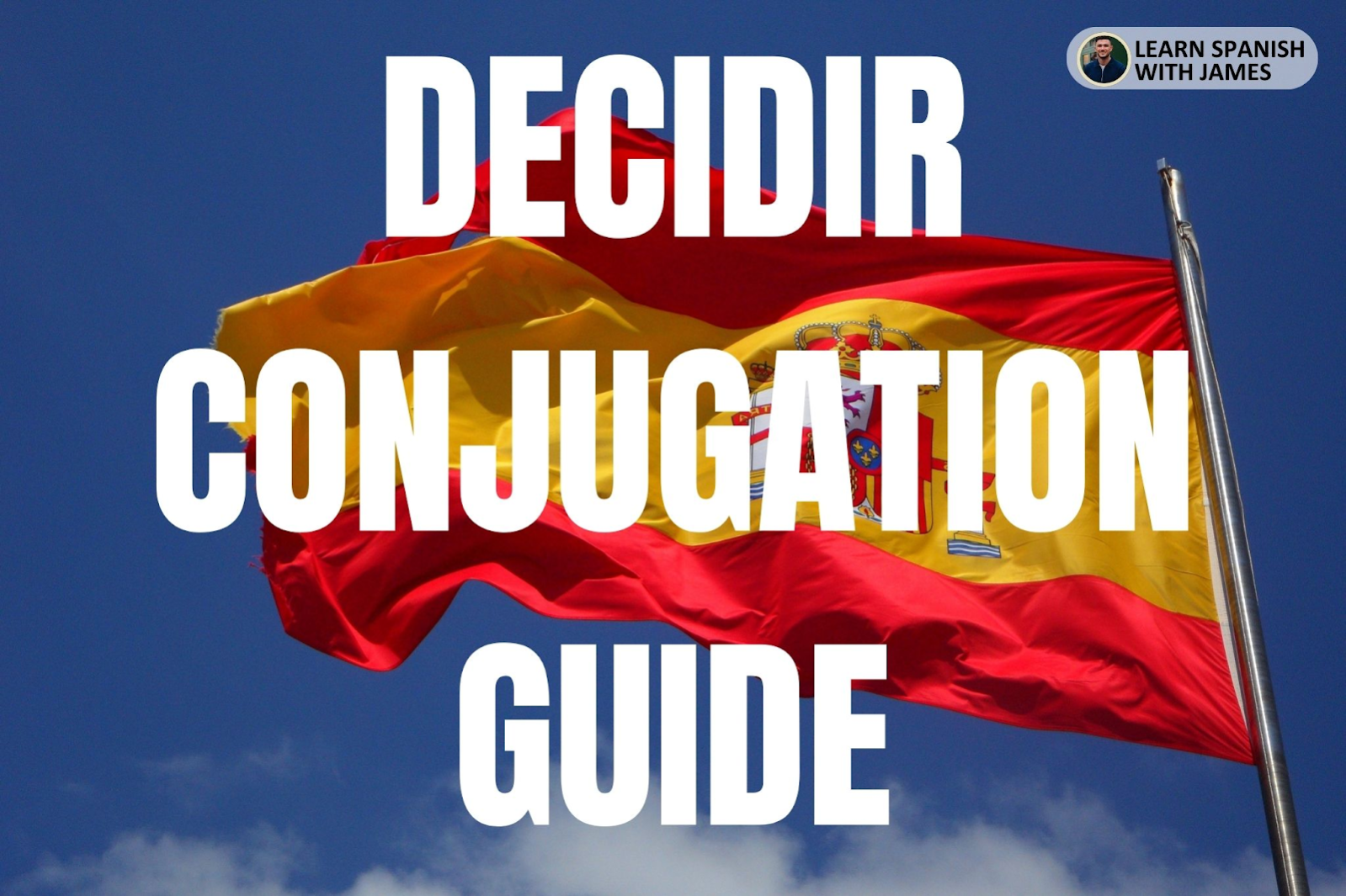Decidir Conjugation Chart & Full Tense Guide

“Decidir,” means “to decide,” and it’s an important Spanish verb to learn. And its resemblance to English, and the fact that it’s a regular verb, makes it an easy verb to learn.
I’m James, from Learn Spanish With James, and the host of the Learn Spanish With James Podcast.
In this guide, you’ll find a verb chart for each tense and every “decidir” conjugation, with examples of its usage across different tenses.
From present to past, subjunctive to conditional, you’ll learn how to conjugate “decidir” and explore English translations, sample sentences, and practical insights to help you use this Spanish verb as native speakers do.
Present Tense
Pronouns Pronombres Conjugation
I yo decido
you tú decides
he,she,it, you(formal) él,ella,usted decide
we nosotros,nosotras decidimos
you pl. vosotros, vosotras decidís
they, you pl. (formal) ellos,ellas,ustedes deciden
When We Use the Present Tense
The present tense in Spanish is used to describe actions that are currently happening, habitual actions, or general truths.
Sometimes, we also use this tense in Spanish to express actions that will happen in the near future.
Like other -IR verbs, the regular verb ”decidir” has a predictable conjugation pattern in the present tense.
You will see this in the example sentences below, and in the “decidir” conjugation chart above.
Top Tip: “Decidir” can also be used with a modal verb. For example: “Nadie puede decidir que unos son más importantes que otros.” (Nobody can decide that some are more important than others.)
Examples of the Spanish Verb “Decidir” in the Present Tense
- Yo decido ir al cine esta noche. (I decide to go to the cinema tonight.)
- Tú decides qué película veremos. (You decide which movie we will watch.)
- Él decide no venir con nosotros. (He decides not to come with us.)
- Nosotros decidimos comer pizza para la cena. (We decide to have pizza for dinner.)
- Vosotros decidís qué hacer después. (You all decide what to do next.)
- Ellos deciden esperar afuera. (They decide to wait outside.)
Preterite Tense
Pronouns Pronombres Conjugation
I yo decidí
you tú decidiste
he, she. it, you (formal) él, ella, usted decidió
we nosotros, nosotras decidimos
you (plural) vosotros, vosotras decidisteis
they, you (pl. formal) ellos, ellas, ustedes decidieron
When We Use the Preterite Tense
The preterite tense is used to describe completed actions in the past, especially those with a specific beginning and end.
The literal translation is “decided”. For example, “Last night, I decided to take a bath.”
Again, the verb ”decidir” has a regular conjugation pattern in the preterite tense.
Top Tip: In order to learn every “decidir” preterite tense conjugation, check out other -IR verbs in the preterite tense, including “pedir“, “seguir”, “vivir”, “escribir”, and “salir”.
Examples of the Regular -Ir Verb “Decidir” in the Preterite Tense
- Yo decidí ir al cine ayer. (I decided to go to the cinema yesterday.)
- Tú decidiste qué película ver. (You decided which movie to watch.)
- Él decidió no venir con nosotros. (He decided not to come with us.)
- Nosotros decidimos comer pizza para la cena anoche. (We decided to have pizza for dinner last night.)
- Vosotros decidisteis qué hacer después. (You all decided what to do next.)
- Ellos decidieron esperar afuera la semana pasada. (They decided to wait outside last week.)
Imperfect Tense
Pronouns Pronombres Conjugation
I yo decidía
you tú decidías
he, she, it, you (formal) él, ella, usted decidía
we nosotros, nosotras decidíamos
you (plural) vosotros, vosotras decidíais
they, you(pl. formal) ellos, ellas, ustedes decidían
When We Use the Imperfect
The imperfect past is used to describe ongoing or habitual actions in the past, as well as to provide background information or set the scene.
The translation is both “used to decide” and “was deciding”.
Do you notice how this is different from the preterite tense “decided”?
“Decidir” is a Spanish verb with a regular conjugation pattern for the imperfect past tense, and it’s really easy to learn.
Just look at the “decidir” conjugation chart above, and the example sentences below to see these conjugations in use.
Examples of the Imperfect Spanish Verb Conjugation for “Decidir”
- Yo decidía ir al cine cada fin de semana. (I used to decide to go to the cinema every weekend.)
- Tú decidías qué película ver. (You used to decide which movie to watch.)
- Él decidía no venir con nosotros. (He used to decide not to come with us.)
- Nosotros decidíamos comer pizza para la cena todos los viernes. (We used to decide to have pizza for dinner every Friday.)
- Vosotros decidíais qué hacer después. (You all used to decide what to do next.)
- Ellos decidían esperar afuera mientras llovía. (They decided to wait outside while it was raining.)
Future Tense
Pronouns Pronombres Conjugation
I yo decidiré
you tú decidirás
he,she,it, you(formal) él,ella,usted decidirá
we nosotros,nosotras decidiremos
you pl. vosotros, vosotras decidiréis
they, you pl. (formal) ellos,ellas,ustedes decidirán
When We Use the Future Tense
The future tense is used to describe actions that will occur in the future.
For example, “I will decide what we do next; it’s not up to you!” This is an example of the future tense.
This differs from the conditional tense, which we’ll come onto shortly. I explain the key differences in this guide to Spanish verb tenses.
Below you will see each “decidir” conjugation in the future tense.
Examples of “Decidir” in the Future Tense
- Yo decidiré qué hacer mañana. (I will decide what to do tomorrow.)
- Tú decidirás si vienes con nosotros o no. (You will decide if you come with us or not.)
- Él decidirá a quién invitar a la fiesta. (He will decide later whom to invite to the party.)
- Nosotros decidiremos a dónde ir de vacaciones. (We will decide where to go on vacation.)
- Vosotros decidiréis quién conduce. (You all will decide who drives.)
- Ellos decidirán cuándo partir. (They will decide when to leave.)
Conditional Tense
Pronouns Pronombres Conjugation
I yo decidiría
you tú decidirías
he,she,it, you(formal) él,ella,usted decidiría
we nosotros,nosotras decidiríamos
you pl. vosotros, vosotras decidiríais
they, you pl. (formal) ellos,ellas,ustedes decidirían
When We Use the Conditional Tense
The conditional tense is used to express what would happen under certain conditions, or to express polite requests or hypothetical situations.
For example, “I would go with her if I thought she’d appreciate the gesture!”
This is a really useful tense to learn, as we can use it to trigger the Spanish imperfect subjunctive.
Top Tip: Mixing the conditional tense with the imperfect subjunctive is a GAME CHANGER when it comes to achieving top marks in your Spanish speaking exams.
Examples of “Decidir” in the Conditional Tense
- Yo decidiría si estuviera en tu lugar. (I would decide if I were in your place.)
- Tú decidirías qué hacer si tuvieras más información. (You would decide what to do if you had more information.)
- Él decidiría si no estuviera tan ocupado. (He would decide if he weren’t so busy.)
- Nosotros decidiríamos si tuviéramos más tiempo. (We would decide if we had more time.)
- Vosotros decidiríais si os lo pidieran con amabilidad. (You all would decide if they asked you politely.)
- Ellos decidirían si les ofrecieran una mejor opción. (They would decide if they were offered a better option.)
Perfect Tense
Pronouns Pronombres Auxiliary verb ‘haber’ Past Participle
I yo he decidido
you tú has decidido
he,she,it, you(formal) él,ella,usted ha decidido
we nosotros,nosotras hemos decidido
you pl. vosotros, vosotras habéis decidido
they, you pl. (formal) ellos,ellas,ustedes han decidido
When We Use the Perfect Tense
The perfect tense is used to describe actions that have been completed.
An example of this in English is “I have decided to go on holiday”.
We form the perfect tense by using the auxiliary verb “haber” and the past participle of “decidir”, which is “decidido”.
Study the example sentences to see how to combine the perfect tense with the preterite tense, and the Spanish subjunctive.
Top Tip: If you want to get used to using the perfect tense, check out my other Spanish verb conjugation guides, including “ir”, “venir”, “recibir“, “ir“, “salir“, and “oír“.
Examples of “Decidir” in the Preterite Perfect Tense
- Yo había decidido ir al cine cuando me llamaste. (I had decided to go to the cinema when you called me.)
- Tú habías decidido qué película ver antes de que llegara yo. (You had decided which movie to watch before I arrived.)
- Él ya había decidido no venir con nosotros antes de que le preguntáramos. (He had already decided not to come with us before we asked him.)
- Nosotros habíamos decidido comer pizza para la cena antes de que nos cancelaran la reserva en el restaurante. (We had decided to have pizza for dinner before our reservation at the restaurant was canceled.)
- Vosotros ya habíais decidido qué hacer después cuando nos unimos al grupo. (You all had already decided what to do next when we joined the group.)
- Ellos habían decidido esperar afuera antes de que empezara a llover. (They had decided to wait outside before it started raining.)
Pluperfect Tense
Pronouns Pronombres Auxiliary verb ‘haber’ Past Participle
I yo había decidido
you tú habías decidido
he,she,it, you(formal) él,ella,usted había decidido
we nosotros,nosotras habíamos decidido
you pl. vosotros, vosotras habíais decidido
they, you pl. (formal) ellos,ellas,ustedes habían decidido
When We Use the Pluperfect Tense
We use the pluperfect tense to describe actions that had already been completed before another past action or point in time.
If we take “decidir” as our example, this becomes “había decidido” – literally, “had decided”.
Again, you’ll notice that in order to use the pluperfect tense, we need to conjugate “haber” and use the past participle of the Spanish verb in its infinitive form.
Examples of “Decidir” in the Pluperfect Tense
- Yo había decidido ir al cine cuando me llamaste. (I had decided to go to the cinema when you called me.)
- Tú habías decidido qué película ver antes de que llegara yo. (You had decided which movie to watch before I arrived.)
- Él ya había decidido no venir con nosotros antes de que le preguntáramos. (He had already decided not to come with us before we asked him.)
- Nosotros habíamos decidido comer pizza para la cena antes de que nos cancelaran la reserva en el restaurante. (We had decided to have pizza for dinner before our reservation at the restaurant was canceled.)
- Vosotros ya habíais decidido qué hacer después cuando nos unimos al grupo. (You all had already decided what to do next when we joined the group.)
- Ellos habían decidido esperar afuera antes de que empezara a llover. (They had decided to wait outside before it started raining.)
Future Perfect Tense
Pronouns Pronombres Auxiliary verb ‘haber’ Past Participle
I yo habré decidido
you tú habrás decidido
he,she,it, you(formal) él,ella,usted habrá decidido
we nosotros,nosotras habremos decidido
you pl. vosotros, vosotras habréis decidido
they, you pl. (formal) ellos,ellas,ustedes habrán decidido
When We Use the Future Perfect Tense
The future perfect tense is used to describe actions that will have been completed by a certain point in the future.
An example of this is “I will have decided”. Again, we’re using “haber” to create this tense.
If you’ve learned the future tense already, then remembering this should be easier to remember.
Top Tip: Learn the past participle for “escribir” to learn that not all past participles are created equal. You’ll find out why in this guide to every “escribir” conjugation.
Examples of “Decidir” in the Future
- Yo habré decidido qué hacer para entonces. (I will have decided what to do by then.)
- Tú habrás decidido si vienes con nosotros o no. (You will have decided whether you come with us or not.)
- Él habrá decidido antes de que empiece la reunión. (He will have decided before the meeting starts.)
- Nosotros habremos decidido a dónde ir de vacaciones para el verano. (We will have decided where to go on vacation for the summer.)
- Vosotros habréis decidido quién se encarga de la organización. (You all will have decided who takes care of the organization.)
- Ellos habrán decidido cuándo regresar antes de que nos demos cuenta. (They will have decided when to return before we realize.)
Conditional Perfect Tense
Pronouns Pronombres Auxiliary verb ‘haber’ Past Participle
I yo habría decidido
you tú habrías decidido
he,she,it, you(formal) él,ella,usted habría decidido
we nosotros,nosotras habríamos decidido
you pl. vosotros, vosotras habríais decidido
they, you pl. (formal) ellos,ellas,ustedes habrían decidido
When We Use the Conditional Perfect Tense
The conditional perfect tense is used to express what would have happened under certain conditions in the past.
Once again, we need to combine the conjugated forms of ”haber” and the past participle ”decidido.”
Examples of “Decidir” in the Conditional Perfect Tense
- Yo habría decidido si hubiera tenido más información. (I would have decided if I had had more information.)
- Tú habrías decidido qué hacer si te lo hubieran pedido con amabilidad. (You would have decided what to do if they had asked you politely.)
- Él habría decidido si no hubiera estado tan ocupado. (He would have decided if he hadn’t been so busy.)
- Nosotros habríamos decidido si hubiéramos tenido más tiempo. (We would have decided if we had had more time.)
- Vosotros habríais decidido si os lo hubieran propuesto antes. (You all would have decided if they had suggested it earlier.)
- Ellos habrían decidido si les hubieran ofrecido una mejor opción. (They would have decided if they had been offered a better option.)
Present Subjunctive
Pronouns Pronombres Conjugation
I yo decida
you tú decidas
he,she,it, you(formal) él,ella,usted decida
we nosotros,nosotras decidamos
you pl. vosotros, vosotras decidáis
they, you pl. (formal) ellos,ellas,ustedes decidan
When We Use the Present Subjunctive
We won’t delve into it now, but remember that we use the Spanish subjunctive to express desires, doubts, wishes, or uncertain conditions.
The present subjunctive is one of the toughest forms of Spanish verb conjugation for learners, based mainly on the confusion around when to use it.
Examples of the “decidir” in the Present Subjunctive
- Es importante que yo decida pronto y encuentre un área para su protección. (It’s important that I decide soon and find an area for your protection.)
- Quiero que tú decidas qué hacer. (I want you to decide what to do.)
- Dudamos que él decida venir con nosotros. (We doubt that he decides to come with us.)
- Esperamos que nosotros decidamos bien. (We hope that we decide well.)
- Recomiendo que vosotros decidáis juntos. (I recommend that you all decide together.)
- No creo que ellos decidan sin pensarlo. (I don’t think they decide without thinking.)
Imperfect Subjunctive
Pronouns Pronombres Conjugation
I yo decidiera, decidiese
you tú decidieras, decidieses
he,she,it, you(formal) él,ella,usted decidiera, decidiese
we nosotros,nosotras decidiéramos, decidiésemos
you pl. vosotros, vosotras decidierais, decidieseis
they, you pl. (formal) ellos,ellas,ustedes decidieran, decidiesen
When We Use the Imperfect Subjunctive
The imperfect subjunctive is used to express hypothetical situations or uncertain conditions in the past (as opposed to the present in the previous example).
Look at the “decidir” conjugation chart above to see the endings. The examples below also show you how to use this tense in context.
Examples of the “decidir” in the Imperfect Subjunctive
- Si yo decidiera por ti, iríamos al cine. (If I were to decide for you, we would go to the cinema.)
- Aunque tú decidieras, no cambiaría nada. (Even if you were to decide, nothing would change.)
- No estábamos seguros de que él decidiera venir con nosotros. (We weren’t sure if he would decide to come with us.)
- Si nosotros decidiéramos, lo haríamos juntos. (If we were to decide, we would do it together.)
- Dudo que vosotros decidierais sin consultar. (I doubt you all would decide without consulting.)
- Era improbable que ellos decidieran sin pensar en las consecuencias. (It was unlikely that they would decide without thinking about the consequences.)
Affirmative Imperative
Pronouns Pronombres Conjugation
you tú ¡decide!
he,she,it, you(formal) él,ella,usted ¡decida!
we nosotros,nosotras ¡decidamos!
you pl. vosotros, vosotras ¡decidid!
they, you pl. (formal) ellos,ellas,ustedes ¡decidan!
When We Use The Affirmative Imperative
The affirmative imperative is used to give direct commands or orders in a positive manner.
When we use it for ”decidir”, we are instructing someone to make a decision. Here are the conjugations and examples for this regular -IR verb in the imperative mood.
Examples of “Decidir” in The Affirmative Imperative
- Decide qué hacer. (Decide what to do.)
- Decidamos juntos. (Let’s decide together.)
- Decidid primero. (You all decide first.)
- Decidan con cuidado. (Decide carefully.)
Negative Imperative
Pronouns Pronombres Conjugation
you tú ¡no decidas!
he,she,it, you(formal) él,ella,usted ¡no decida!
we nosotros,nosotras ¡no decidamos!
you pl. vosotros, vosotras ¡no decidáis!
they, you pl. (formal) ellos,ellas,ustedes ¡no decidan!
When We Use The Negative Imperative
The negative imperative is used to give direct commands or orders in a negative manner, usually indicating what someone should not do.
When we conjugate ”decidir” in the negative imperative, we are instructing someone not to decide something or in a certain manner.
Here are some example sentences. Note that in the negative form, it takes the same pattern as an –AR verb.
Examples of “Decidir” in The Negative Imperative
- No decidas sin pensarlo. (Don’t decide without thinking.)
- No decidamos sin consultar. (Let’s not decide without consulting.)
- No decidáis a la ligera. (Don’t decide lightly.)
- No decidan sin considerar todas las opciones. (Don’t decide without considering all the options.)
Online Spanish Courses & Grammar Courses
For a full list of Beginner, Intermediate and Advanced Courses, check out this full list of online Spanish courses.
I put this list together myself, and it comprises a mixture of courses that offer Spanish grammar practice for all levels, conversational practice, listening and writing exercises in Spanish, free Spanish courses, and a whole lot more.
The fastest way to learn Spanish is to test a mixture of Spanish resources and choose the course that coincides most with your learning style.
In addition to online Spanish courses, on this site you will find a wide range of Spanish podcasts, Spanish apps, Spanish YouTube channels, and both online and physical Spanish language schools.

About James – Or Should that be Santiago?
My name is James. I am a Brit with a love for the Spanish language. I have lived in Spain, Argentina, and Costa Rica, and I have been teaching Spanish for over a decade. This site will show you how to master the elements of Spanish grammar that often dishearten learners. I hope you enjoy the site and find it useful.
If you are interested in taking your Spanish to the next level, check out the Courses section for a full list of the Spanish courses I suggest. All reviews are based on my personal opinions.







